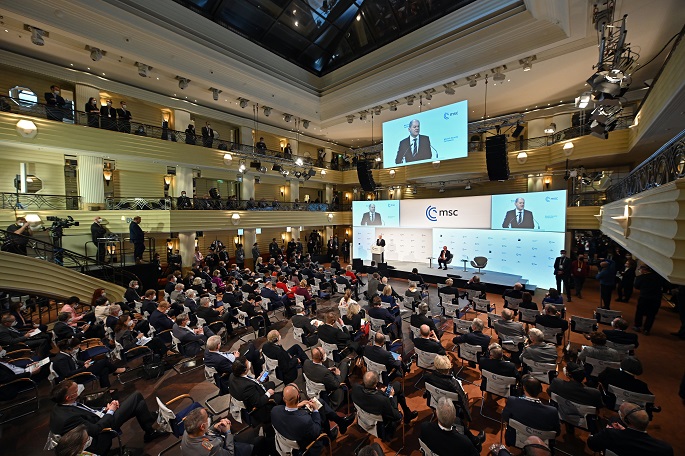Global security a focus in Munich, but Ukraine worries dominate
Published : 19 Feb 2022, 21:49
Facing the spectre of a war in Eastern Europe, world leaders gathered in Munich on Saturday to discuss how best to create a more secure world.
Although tensions in Ukraine were never far from the surface - speaker after speaker discussed the fears of a Russian invasion and highlighted the likely response from the West in such a case - attendees at the Munich Security Conference also tried to touch on other topics.
That meant subjects like semiconductor shortages or relations in the Arctic were also on the agenda in a day with speeches from officials like German Chancellor Olaf Scholz, US Vice President Kamala Harris and British Prime Minister Boris Johnson.
Scholz noted that it will be important to strengthen cooperation with China on issues of "mutual interest." He mentioned the fight against climate change and poverty as well as arms control.
The German government wants to take a clear stand "where the preservation of the multilateral order is threatened or human rights are trampled on."
The world of the 21st century will have different centres of power, said the chancellor. In Asia, he said, it is a matter of a resurgence to superpower status.
"There is nothing wrong with that, on the contrary," Scholz said. "It becomes problematic where the rise in importance is translated into demands for allegiance or zones of influence. When universal rules that one supported yesterday are swept aside today," he said.
"No country should be the backyard of another."
Following on those comments, Chinese Foreign Minister Wang Yi spoke to the group via a videolink, arguing for world powers to act like such, not throwing around their weight or imposing unilateral sanctions.
"The sovereignty and independence of any country should be respected. This is a basic norm of international relations," he said.
Separately, Scholz called for stronger efforts to integrate the Western Balkans into the European Union.
"It is not enough to name the prospect of enlargement for this region as a strategic goal. We must actively push it forward," the German leader said on Saturday. "When I speak of the European Union, I am thinking of the countries of the Western Balkans."
At the same time, Scholz warned that the EU could fall by the wayside in the event of "geopolitical power shifts."
"We Europeans will only preserve our capacity to act, our decision-making autonomy, if we pool our will and our capabilities in the European Union," he said. "The European Union is our framework for action, our chance to remain power among powers. That's what it's all about when we talk about European sovereignty."
Another focus was Iran, where Scholz urged Iran to stick to negotiations to revive a 2015 agreement under which it agreed to forgo weapons development in exchange for a lifting of sanctions.
One detail bemoaned by several speakers at the meeting was a lack of input from Russia at this year's event.
For the first time since 1991, the country is not represented with an official delegation in Munich.


